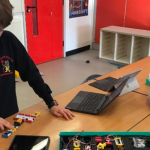STEM, and a knowledge of its fields (science, technology, engineering, and mathematics), has shaped and aided the development of the everyday life of humans. The expansion of our knowledge of science has led to a better understanding of the world.
Ensuring that children understand basic scientific concepts is vital for the development of their awareness of the world around them. It is also important for their cognitive development and helps improve their problem-solving skills. By making science accessible to kids, we can help them develop important life skills, which will help them communicate, observe, and understand the world better.
Introducing children to science can feel like a daunting task, but it does not have to be!
Children have an inquisitive nature and letting them have fun as they learn about science is an excellent way of getting them to engage. Science can be easily accessible with the help of the Twin Science App and by trying out easy experiments at home!
The importance of learning about science
Science is everywhere in the world. Learning about science means learning about how and why things function the way they do. In order to understand the behaviour of the world, and the structures that make and surround us, one must understand science. Scientific research has led to the improvement of the quality of life. With improvements in communication, travel and medicine, the expansion of scientific knowledge has aided humans in a multitude of ways. This is a key reason why we must educate children, the scientists, and leaders of the future, about these concepts of biology, chemistry, and physics, as it is highly beneficial for them to understand the nature of the world they live in.
A knowledge of science flourishes the minds of children, and moulds them into critical thinkers. Children with science experience and knowledge become able to form their own opinions on what they observe. Science enables kids to gather the skills they need to sense problems and tackle them on their own.
How can science be fun?
A science lesson may connote a complicated and boring lecture, but that does not have to be the case. Learning about science can be fun and enticing! Science can be learned outside of a school setting, where we tend to have more liberties, and can therefore have as much fun as we like.
Children learn best when they can see and feel what’s going on! Thus, it is highly profitable to introduce science to kids by trying out simple experiments at home. Children are more likely to be engaged if they can experience the subject hands-on. In fact, according to the modality effect of the cognitive load theory, information is understood and retained better when it is provided both visually and auditorily. Whether it be through a purchased science kit, or simply by using the items you have at home, if children can see their curiosity come to life, they will not only comprehend the idea better, but will also enjoy the topic and crave to learn more! This is also a great way to introduce science as a fun topic.
How to make science fun and accessible
Research shows that if children have fun while learning, then they will absorb information better. Having fun while learning also encourages the child to learn more, as it associates the subject with an enjoyable experience. By incorporating an element of excitement, such as through a home-made chemical reaction, you will motivate your child into enthusiastically learning about the wonders of science!
The benefits of doing experiments
Apart from adding a splash of fun into scientific learning, doing experiments also has other added benefits! To start off, doing a scientific project at home will boost your child’s confidence. When the child sees that they have initiated a creation, they will be filled with an abundance of pride and self-confidence. The child will feel as though they can be capable of achieving other great things and will be filled with joy.
Experiments also help children exercise their creative outlet. Children can creatively express themselves, during an experiment which includes aspects of art, and can even be able to play around and get messy!
Children are naturally curious, and science experiments are a perfect way to nurture your child’s curiosity. Witnessing a real-life representation of their curiosities can be fascinating for a child and will completely engage them. A child’s inquiries can be answered through a science experiment. As a result, children would be more inclined to learn more, as it feeds their sense of curiosity.
Lastly, but certainly not least, science experiments help enhance a kid’s core skills. Through experiments, a child will learn about organisation, following instructions, planning, and setting goals. Kids will learn about how they need to think and plan in order to seek the answer they are searching for.
“I hear and I forget. I see and I remember. I do and I understand.”
– Confucius
How does Twin help STEM become fun and accessible?
Twin Science assists in making STEM more fun and accessible for kids in numerous different ways. The Twin Science STEM kits merge play and learning, helping initiate an appreciation for technology and science in kids. The STEM kits teach children a plethora of scientific and robotics skills, and the incorporation of LEGO-compatible modules makes these kits an enjoyable experience for kids. Twin Science STEM kits bridge technology and play, and allow kids to not only be creative, but also have fun whilst establishing a familiarity with STEM knowledge.
Twin Science makes STEM fun and accessible also through their app! The Twin app invites kids to play science related games, learn about scientific facts and collect coins along the way, which can be used to purchase STEM kits and even Robux!
The Twin app allows children to find out about fun trivia facts about different fields of science, and even teaches basic coding. Furthermore, the app provides amusing challenges which can easily be completed at home that help you experience scientific concepts, such as different theories of physics – like how to defy gravity!




